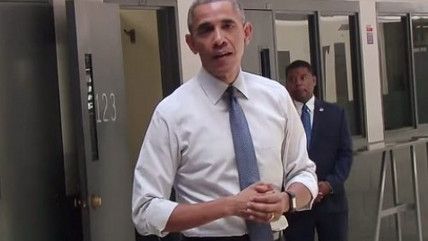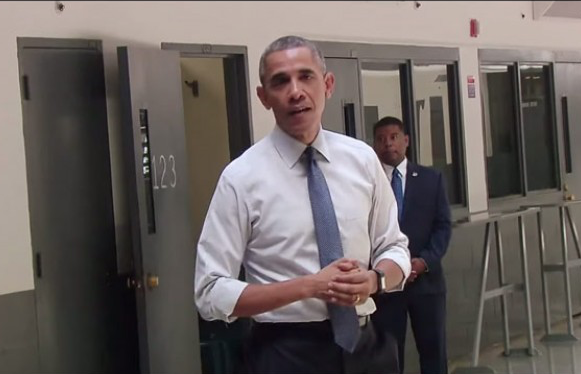Obama Bans Solitary Confinement for Juveniles; Supreme Court Expands Parole for Juveniles Serving Life
A big day for the rights of minors in the criminal justice system.

President Obama and the Supreme Court took

two very significant steps forward in the realm of criminal justice reform yesterday.
In a Washington Post op-ed, the president announced a ban on the use of solitary confinement for juveniles in federal prisons, while the Supreme Court released its ruling in the case of Montgomery v. Louisiana, a 6-3 decision making the court's 2012 ruling in Miller v. Alabama (which ended the practice of sentencing juveniles to mandatory life sentences) retroactively effective. This means thousands of people convicted of murder before the age of 18 may have a chance of parole at some point during their sentence.
Laying out his reasoning for a federal ban on the use of solitary confinement for children, President Obama wrote:
Research suggests that solitary confinement has the potential to lead to devastating, lasting psychological consequences. It has been linked to depression, alienation, withdrawal, a reduced ability to interact with others and the potential for violent behavior. Some studies indicate that it can worsen existing mental illnesses and even trigger new ones. Prisoners in solitary are more likely to commit suicide, especially juveniles and people with mental illnesses.
The United States is a nation of second chances, but the experience of solitary confinement too often undercuts that second chance. Those who do make it out often have trouble holding down jobs, reuniting with family and becoming productive members of society. Imagine having served your time and then being unable to hand change over to a customer or look your wife in the eye or hug your children.
Writing for the Associated Press, Kathleen Hennessy explains how Obama came to his decision:
Obama asked the Justice Department to review the use of solitary confinement last summer, as part of the administration's increased focus on the criminal justice system. Activists have been pushing for changes to the prison system.
The department review yielded a series of recommendations and 50 "guiding principles," which officials said would aim to ensure solitary confinement was an increasingly rare punishment used as an option of last resort when inmates posed a danger to staff, other inmates or themselves.
The changes would also expand treatment for the mentally ill and ensure that inmates in solitary can spend more time outside their cells.
Obama said the reforms would affect roughly 10,000 inmates in the federal system. Roughly 100,000 people are in solitary confinement in the U.S., he said, adding that he hoped the changes would serve as a model for reforms at the state level.
Also in the Washington Post, Juliet Eilperin notes the growing push to limit the use of solitary at the state level.
At least a dozen states have taken steps in the past two years to curtail the use of solitary confinement, either in response to lawsuits or through legislative and administrative changes. An increasing number of studies show a connection between isolating prisoners and higher rates of recidivism.
In recent weeks, Illinois and Oregon, in response to lawsuits, have announced they will exclude seriously mentally ill inmates from solitary confinement, and last month New York state reached a five-year, $62 million settlement with the New York Civil Liberties Union in which it pledged to significantly cut the number of prisoners in solitary as well as the maximum time they could stay there. California reached a settlement in September, pledging to overhaul the way it treats almost 3,000 inmates who are frequently kept alone for more than 22 hours a day in their cells.
Moving from the executive to the judicial branch, the Supreme Court's decision gives new hope to what could be as many as 2,300 people serving sentences of life without parole, including Taurus Buchanan, who has been serving a life sentence in Louisiana for more than 21 years for killing another child with a single punch at the age of 16.
Reason TV's Todd Krainin reported on children in solitary confinement in 2013. Watch his powerful doc below.


Show Comments (98)